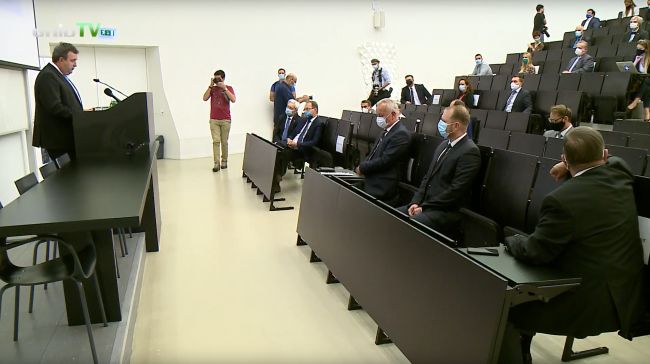The Artificial Intelligence National Laboratory and the National Laboratory for Autonomous Systems have been launched under the leadership of SZTAKI
Dr. László Palkovics, Minister of Innovation and Technology, announced the foundation of 16 National Laboratories at a press conference at the University of Pécs, Hungary. The National Laboratories are formed as consortia of research centers, universities and industry. Two of the National Laboratories, the Artificial Intelligence National Laboratory and the National Laboratory for Autonomous Systems, are led by the Institute for Computer Science and Control (SZTAKI), Hungary.
The Artificial Intelligence National Laboratory (MILAB) aims to strengthen Hungary's position in AI. Research in MILAB is initiated by integrating flagship projects in medical image processing, transportation, manufacturing, logistics, and by relying on internationally renowned Hungarian mathematicians and physicists among others in the areas of graph theory and network science. Objectives include networking, strengthening synergies between actors, representing competencies in industry and international projects. MILAB aims to strengthen the international relations of the partners as part of an interconnected research ecosystem, involving source multiplication, funding for risky or high societal utility research, and coordination with market and application needs.
The MILAB research plan follows the Hungarian National Artificial Intelligence Strategy (2020-2030) and implements its research components. Stakeholder needs and requirements from industry, society and government are considered in the cooperation of the MILAB Project Office and the Hungarian Artificial Intelligence Coalition Program Office.
MILAB is coordinated by SZTAKI, with the Rényi Institute of Mathematic as lead partner in basic research. The Laboratory is a consortium of 10 research centers, universities, and governmental bodies.
The National Laboratory for Autonomous Systems is a consortium led by the Institute for Computer Science and Control with the participation of the Budapest University of Technology and Economics and Széchenyi University of Győr.
The Laboratory aims to provide efficient and innovative autonomous solutions for road vehicles, aircraft and mobile robots by relying on a wide group of Hungarian experts. Activities focus on research, development, and demonstration of the components and functional design of experimental vehicles, cyber-physical manufacturing and logistics systems. The Laboratory will operate an autonomous vehicle laboratory and collaborate with the ZalaZone autonomous vehicle test track.
The research results and know-how generated by the project will not only help increase the added value of the national automotive industry, but will also increase the social acceptance of autonomous vehicles by communicating the results, through closer collaboration between industrial companies and the research community.
The Laboratory aims to integrate academic and industrial actors, micro, small and medium-sized enterprises, as well as educational institutions in a Hungarian innovation ecosystem to increase competitiveness. The Laboratory is in line with the European Union's research and innovation objectives, open innovation, open science and knowledge transfer.
